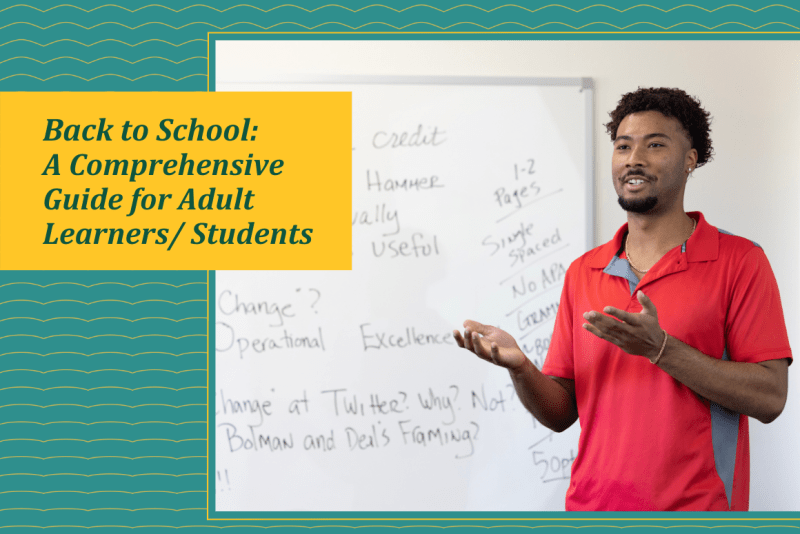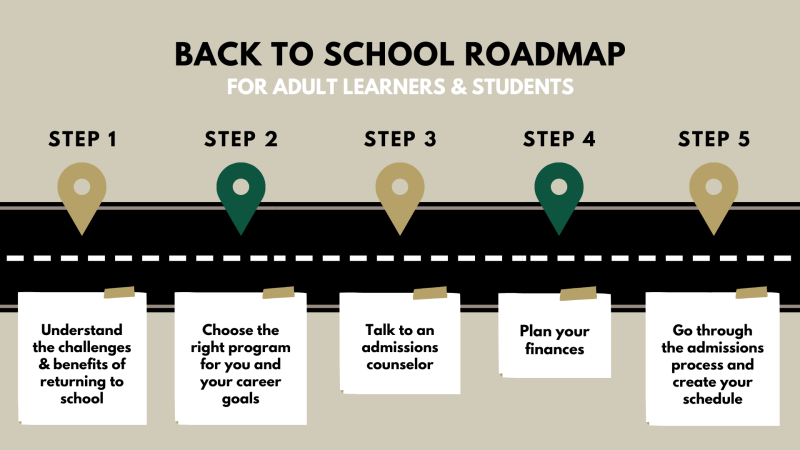
Returning to school as an adult learner or student can be an intimidating prospect. Many adults who are considering returning to school to finish a degree or start a new one have more factors to consider than the average incoming first-year student. However, there are many excellent programs that cater to adult learners. With options from fully online to in-person, going back to school as an adult is more accessible than ever before.
Things to consider before returning to college
The first thing you want to acknowledge as an adult learner is that you are in a different stage of life than most of your traditional younger counterparts. Being an adult learner comes with a different set of responsibilities outside of the classroom and may require more intentional time management. You need a program and university that understands your current responsibilities, which may include:
- Being the sole financial provider for their family
- Full-time employment
- Childcare considerations
- Financial ramifications of paying for classes
- Proximity to the desired program or university
In addition to these commitments, you will likely need to bring yourself up to date on certain technologies. Going back to college may even require a certain up-front investment in computers or tablets, common programs like Microsoft Word and Excel, and other digital tools that are now somewhat commonplace in the classroom.
While these things are important to consider before returning to college, you should also consider some of the benefits to returning to the classroom such as
- More financial and career opportunities
- Sense of accomplishment at achieving a goal
- Engagement with professors and fellow students to build a new network
- The chance to share your unique perspective as an adult learner or professional returning to the classroom
By choosing to go back to school, you are giving yourself the opportunity to take advantage of your unique perspective as an adult. Not only will your professors find your thoughts and work experience valuable, but your fellow classmates will also gain new insights into the subjects you are all studying.
Benefits of going back to college
The benefits of going back to college for an adult learner are synonymous with the benefits of learning a new skill. The experience may serve to broaden your perspective and provide you with new information, modern skills, and greater control over your career path.
Individuals with a college degree are also generally likely to earn higher wages and enjoy greater general wealth than those without college degrees. Additional pros to returning to college include:
- More career options and flexibility
- Improved health
- Access to online and in-person alumni networks
- Individual resilience and sense of accomplishment
- Higher likelihood of homeownership
Even if you are an adult learner who has already ticked some of these boxes, you can still gain a lot by returning to school. The personal growth and confidence that comes with learning in a new environment will always be a takeaway. And if you’re concerned about being the only adult in your classroom, remember there are more adults returning to school now than ever before, especially in California.
______
Who are you called to be?
Pursue your purpose at PLNU.
______
Researching and choosing the right program for you
One of the benefits of returning to school as an adult is that you can take your time researching programs and make the right decision for yourself. Most college freshmen making the decision on which college they will attend don’t have the benefit of years of professional or life experience to help them make a more informed decision. As an adult you can leverage your experience. You have the option of considering all your current commitments and responsibilities as well as the kind of future you want before choosing your program.
Here are some helpful steps when considering a college program:
- Start with the university’s website or program page
- Talk with an admissions counselor or current student or professor in the program
- Determine your availability and career goals
- Research a program’s flexibility with online courses
Finding the right program that supports adult learning takes time. Thankfully, most adult learning programs are tailored for individuals who have other time commitments. Generally, these programs will also take transfer credits if you are coming in with some classes already completed.

Planning your finances and applying for financial aid
As an adult learner, financial planning is vital to making your return to learning as smooth as possible. You have opportunities to pay for school in ways that a traditional younger undergraduate student does not. For instance, if you are a full-time employee, your company may be willing to subsidize your education while you continue working. They may also be able to cover it entirely if you agree to continue working for them after you graduate.
There are also a variety of scholarships and grants dedicated specifically to adult learners returning to school. And nearly every university has a scholarship page that details the specific scholarships available through departments and programs. When applying for any scholarship it’s important to note the qualifications. Some scholarships require you to be a full-time student in a certain type of program and others cannot be combined.
And finally, become familiar with the university’s financial aid office. Speaking to a counselor in the financial aid office will help you understand the options for financing your degree as an adult student.
Navigating the admissions process
The admissions process for an adult learner is relatively similar to the process of applying as a traditional undergraduate student. You will need to start with the admissions office for the particular program you are interested in applying for. It’s also a good idea to take some time to gather the materials you will need before you go online to submit the application. Items that are helpful to have include:
- Driver’s license
- High school transcripts
- Previous college or university transcripts (if applicable)
- Updated resume and cover letter
- Any recommendations or references
Once you have these materials, the best way to move forward with the admissions process is to work with an admissions counselor. They will have the most updated info on how to fill out the application and when to send it in. Admissions counselors can often also make sure you are connected to the right program counselors if you are accepted. From there you can start planning which classes you need to take.
Check out PLNU’s Accelerated Undergraduate Programs
Navigating the return to school as an adult learner is a unique process. Adult learners may have very different responsibilities and motivations than the typical incoming undergraduate student. It follows that the program you choose should be the right one for you academically and financially. So take some time to research, speak with a counselor, and check out the financial aid options available to you for each university.
And look for programs with greater flexibility like PLNU’s accelerated undergraduate options. These programs cater to adult learners' needs with classes fully online as well as in-person at their many campus locations. Learn more about PLNU’s adult-learning programs here and continue your educational journey today.